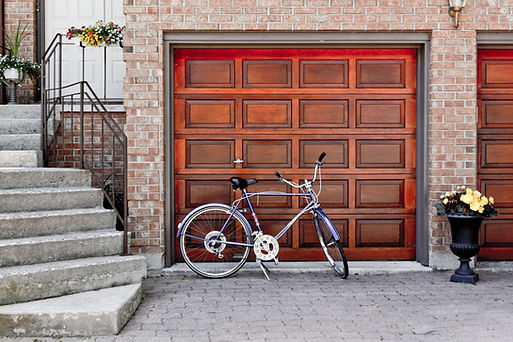
Garage Doors
Choosing the right garage door isn’t just about style—it’s about performance, durability, and how well it stands up to your local climate. From coastal areas with salty air to regions with heavy snow or intense sun, each environment demands a different approach.
Steel Garage Door

Cold & Snowy Climates (e.g., Midwest, Northeast, Mountain States)
Why steel?
-
Steel garage doors are highly durable and can be insulated effectively, which is key in colder regions.
-
With proper insulation (like a polyurethane core), they help maintain internal garage temperature and reduce energy bills.
-
Steel also holds up well under the weight of snow and resists warping or expanding in freezing temps—unlike wood.
Best for: Chicago, Minneapolis, Denver, Buffalo, Cleveland
Storm-Prone Areas (e.g., Southeast, Gulf Coast)
Why steel?
-
Steel doors can be manufactured with wind-load reinforcement to withstand hurricanes and strong storms.
-
They’re less likely to crack or split under pressure, making them a safer, longer-lasting choice in high-wind zones.
Best for: Florida, Louisiana, Texas Gulf Coast, Carolinas
Urban & High-Traffic Areas (e.g., cities and suburbs)
Why steel?
-
Steel is low-maintenance and highly durable, perfect for homes in busier areas where wear and tear (kids, traffic, weather) is more likely.
-
Optional insulation also provides noise reduction, which is helpful in louder urban environments.
Best for: New York City suburbs, Chicago suburbs, Atlanta, Dallas, Detroit
Wood Garage Door

Dry, Mild Climates (e.g., West Coast, Mountain West)
Why wood works here:
-
Wood thrives in areas with low humidity and minimal temperature swings.
-
Dry climates help prevent warping, rotting, or swelling—common issues in wetter regions.
-
These areas often value craftsmanship and curb appeal, making wood a popular aesthetic choice.
Best for: Southern California, Arizona, New Mexico, Utah, Colorado, Nevada
Historic or Upscale Neighborhoods
Why wood works here:
-
Custom wood garage doors match well with historic architecture, Craftsman homes, or high-end builds.
-
These neighborhoods often prioritize aesthetic harmony, and wood provides unmatched warmth and character.
Best for: Boston suburbs, Bay Area, Charleston, Santa Fe, Boulder
Aluminum Garage Door

Coastal Areas & Humid Climates (with caveats)
Why aluminum can work:
-
Naturally resistant to rust and corrosion, making it a better choice than steel in salty coastal air—especially when anodized or powder-coated.
-
Lightweight structure makes it easier on openers and ideal for modern homes where style is a factor.
Best for: Southern California, San Diego, Los Angeles, Tampa, Charleston
Note: In extremely salty air, higher-end aluminum with proper finishes is still a must—otherwise corrosion can still occur over time.
Hot, Dry, Sunny Regions (e.g., Southwest, West)
Why aluminum thrives:
-
UV-resistant finishes available—many aluminum doors come with frosted or tinted glass panels for a high-end, heat-resistant design.
-
They won’t warp or crack from heat exposure, and they reflect sunlight better than darker materials.
Best for: Phoenix, Las Vegas, Palm Springs, El Paso
🚪 Urban / Contemporary Homes (everywhere)
Why it’s a good aesthetic match:
-
Aluminum doors often feature modern, minimalist designs with glass panels, making them ideal for city or custom builds.
-
Lightweight construction is ideal for double doors or frequent use.
Best for: Austin, Seattle, Denver, San Francisco, LA, New York suburbs
Composite garage Door

Humid, Rainy, or Coastal Areas (e.g., Southeast, Pacific Northwest, Coastal California)
Why composite works here:
-
Made from moisture-resistant materials (often wood fibers + resins or synthetic skins), composite doors won’t warp, rot, or swell like natural wood.
-
They’re designed to withstand high humidity and salty air, making them ideal for coastal or wet regions.
-
Composite mimics the look of wood without the downsides—perfect for homeowners who want the aesthetic without the upkeep.
Best for: Seattle, Portland, Miami, Charleston, San Diego
Cold or Snowy Climates (e.g., Northeast, Midwest, Rockies)
Why composite works here:
-
Composite materials are dimensionally stable, so they resist cracking and expanding in freezing temperatures.
-
Many composite doors come with built-in insulation layers, helping retain heat and reduce energy costs in the winter.
Best for: Denver, Minneapolis, Boston, Detroit, Chicago
Extreme Temperature Zones (e.g., Desert Southwest)
Why composite works here:
-
UV-resistant outer layers prevent fading and breakdown under intense sun exposure.
-
They don’t split or dry out like traditional wood, and won’t dent easily like thinner steel.
Best for: Phoenix, Las Vegas, Palm Springs